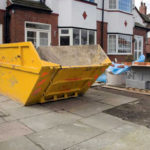Can Plastic Be Recycled?
Over the past several years, society has encouraged the government to tackle the growing concern around plastic pollution and Parliament are under more pressure than ever to declare a ‘climate emergency’. After all, climate change is, in part, caused as a result of poor waste disposal methods as the materials in a landfill take hundreds of years to biodegrade, releasing harmful levels of methane into the atmosphere. Read on as the PWM Skip Hire team go over everything there is to know about recycling plastic…
The Different Varieties of Plastic
Many people are unaware that there are actually seven different types of plastics that products are crafted from. For example, Polyethylene Terephthalate (PET) is a plastic commonly used in food packaging; High-Density Polyethylene (HDPE) is a stronger plastic typically used to contain medicines and shampoo; Polyvinyl Chloride (PVC) is a plastic popularly used in children’s toys despite being considered the most hazardous; Low-Density Polyethylene (LDPE) is a simple plastic that is used in carrier bags and disposable coffee cups; Polypropylene (PP) is a stiffer and heat resistant plastic used in hot food containers; Polystyrene (PS) is a plastic also known as Styrofoam and is used in single-use food packaging; and finally, number 7 plastics are simply referred to as ‘other’ because they cannot be categorised effectively such as nylon, fiberglass and polycarbonate.
The Problem with Plastic
Although there are many different types of plastics in the world, many of them are not recycled effectively because the process is too expensive and industries find it cheaper to create new products. With this said, single-use plastics like PET, PS and others can take a very long time to naturally biodegrade which means that they will negatively affect our atmosphere over time. In fact, it can take over 500 years for a single plastic bottle to decompose and even then, small microscopic fragments will end up in our oceans.
Disposing of Plastic in a Skip
In order to ensure that plastics are treated effectively, many governments have started to introduce schemes to recycle as much of it as possible. After all, there are many suitable plastic recycling methods available for use when one does their research. Luckily, unwanted plastic materials can be disposed of in a skip in order to ensure that they are taken to a suitable facility. Plus, people can also make a small difference by cutting down on their use of single-use plastics.
When it comes to skip hire, it is important to remember that most non-toxic items are suitable for skip disposal. After all, the majority of plastic materials can be taken to specialist recycling facilities and repurposed for further use rather than being thrown in a landfill site. To find out more information, get in contact with the best skip hire Manchester has to offer and speak to a member of the PWM Skip Hire team today!




